The 2018 Stack Overflow Developer Survey is open right now, and we on the Data Team are eagerly awaiting this year's data so we can uncover new insights about the worldwide developer community. Every year, we learn interesting things, whether that's about student developers' attitudes toward industries or fictional representations of coders. I work remotely, along with the majority of the technical employees here at Stack Overflow, so before we have new survey data to explore, let's take one more dive into the 2017 data to see what we can learn about developers who work remotely.
Where are the remote developers?
For starters, in what regions of the world is remote work more prevalent?
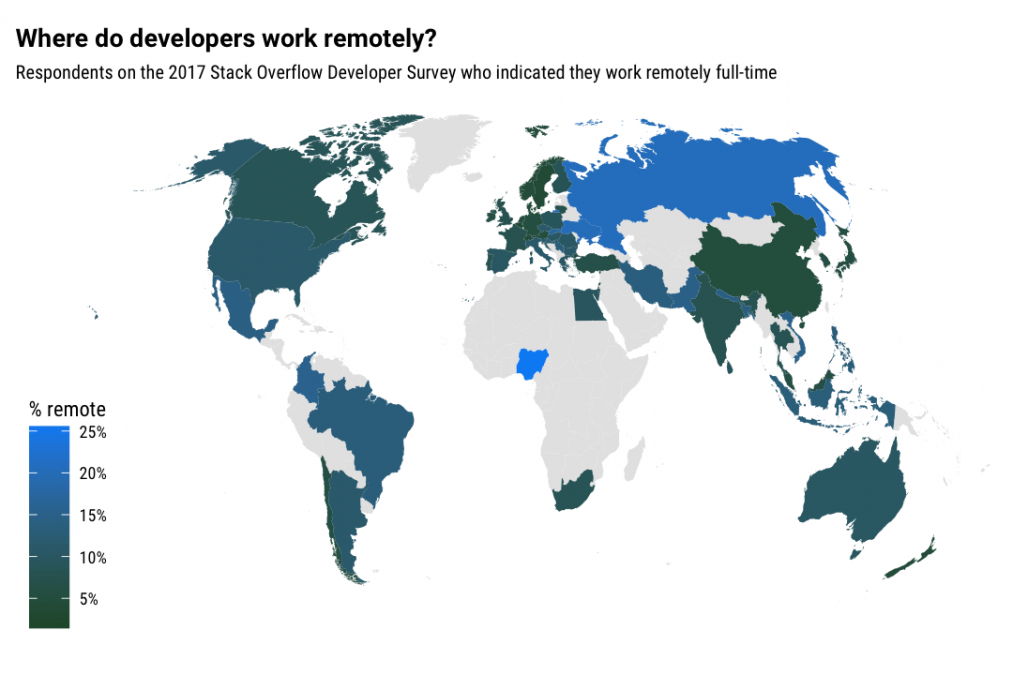
This map shows countries where there were at least 100 respondents on the 2017 Developer Survey. In the United States, 11.2% of respondents said they work remotely full-time, but that proportion varies from much lower values in western Europe (as low as 3.93% in Sweden and 3.47% in Belgium) to higher values in Central Asia, eastern Europe, and Russia (20.5% in Russia). Local economic factors as well as workplace cultural expectations play into these worldwide differences. The size of a company that developers work for also has a strong impact on how likely they are to work remotely.
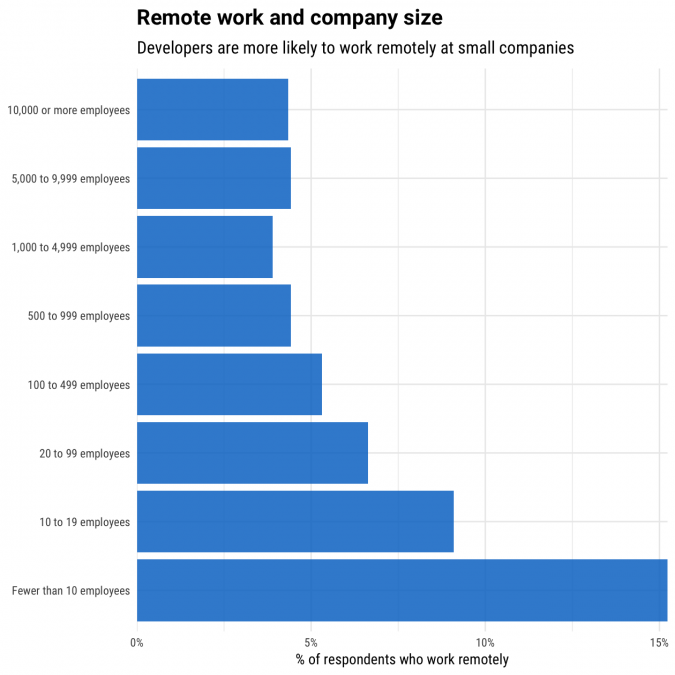
I work here at Stack Overflow, a company that has about 250 employees. We have shared before about how we make our hybrid team of remote and non-remote employees effective together. Our survey results show that developers at small companies (even smaller than Stack Overflow) are more likely to work remotely, while developers working at large companies are less likely to work remotely. It makes sense that smaller companies embrace remote life. These small companies are often starting out, without physical offices, and the developers building these companies work from where they are. When I explored predictive modeling with this dataset (what predicts whether a developer works remotely or not), the size of a developer's company was the strongest predictor of remote work.
Who are the remote developers?
Developers working remotely are more likely to be found working for smaller companies in certain geographic regions, but what are the characteristics of the developers themselves?
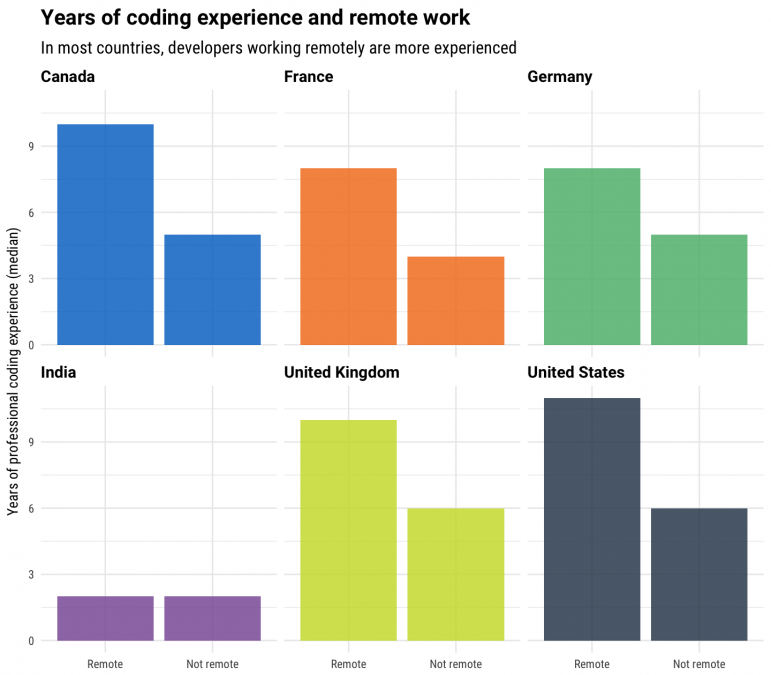
There is a big difference in the overall experience levels of remote and non-remote developers. In most countries, developers who work remotely have more years of professional coding experience than those who work in their companies' offices. This is a large effect, a difference of 5 years of median experience in the United States and Canada. I can understand why companies are more likely to support a developer working remotely who has a proven professional track record. I am a huge proponent of remote careers becoming more accepted in work culture, but it can be complicated to mentor junior developers long-distance. But not impossible! For the past three years, we’ve partnered with Andela, a company training developers on the African continent, to pair their developers with our own in one-on-one mentorship. We’d love to see other companies take the leap too. Not all respondents on the survey shared their salary, but we can use those who did to explore how remote work affects pay.
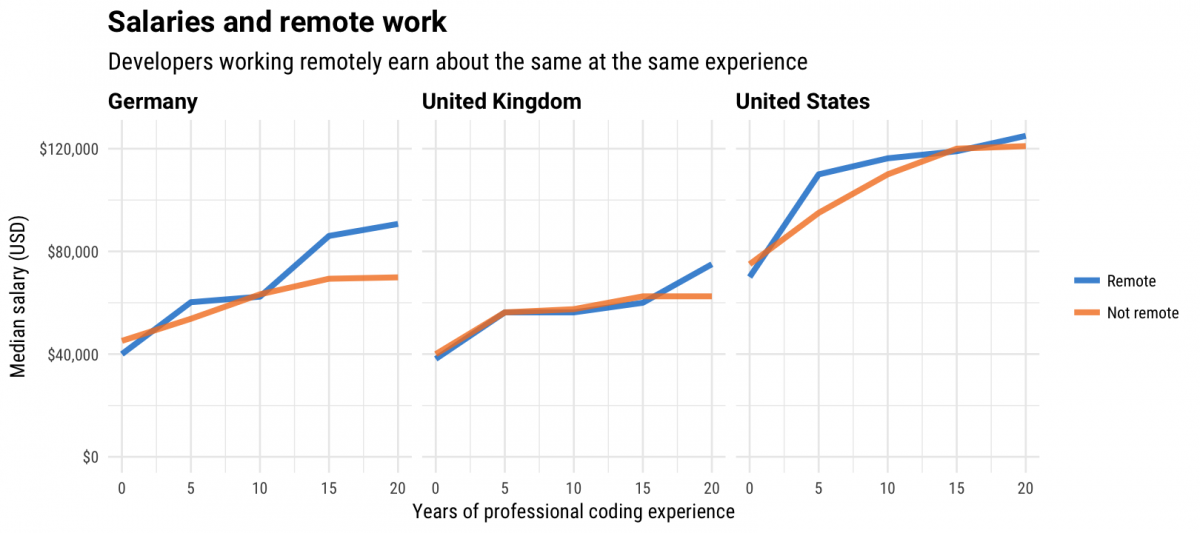
There aren't enormous numbers of remote developers with high experience and high salaries in, for example, Germany, so I caution against over-interpreting minor differences in these plots. Instead, notice that developers who work remotely earn about the same as their counterparts who work in offices. I consider working remotely a benefit that has actual financial value to me and my family, but developers who work remotely are paid about the same as those who don't. If anything, we see remote workers being paid slightly more. Overall, developers are quite satisfied with their careers, with 74.5% of our respondents choosing 7 or above on a 10 point scale for career satisfaction. Certain characteristics of developers, including remote work, are associated with even higher career satisfaction.
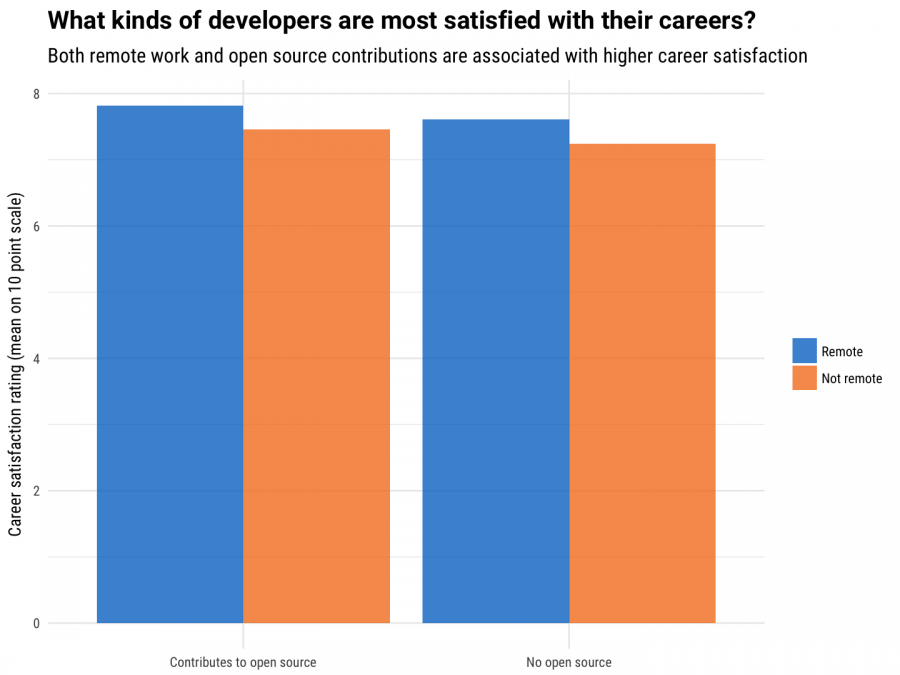
These differences are small (nobody is getting an entire point of "satisfaction", whatever that is, by moving out of an office) but both the difference due to remote work and the difference due to open source contributions are statistically significant. As someone who contributes to open source and who works remotely, neither of these results surprises me one bit. Both of these aspects of my professional life contribute to a healthy balance in my interests and what I spend my time on; both improve my daily quality of life. If you are interested in working remotely, check out companies currently hiring for remote positions on Stack Overflow. These survey results help us understand the developer community better. The 2018 Developer Survey is open right now, and we want to hear from all kinds of developers: those who work remotely and in offices, those from large tech economies like the United States to developing tech economies like Nigeria, those who contribute to open source, and those whose energy is focused on their day job. Our results show that underrepresented groups tend to respond to the Stack Overflow Developer Survey at lower rates, so know that we want to hear what you (yes, you) think. Participate in the Developer Survey today!
